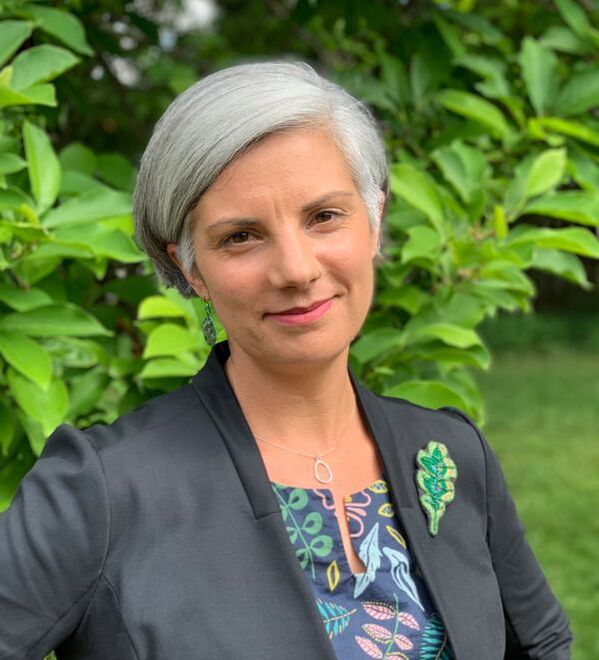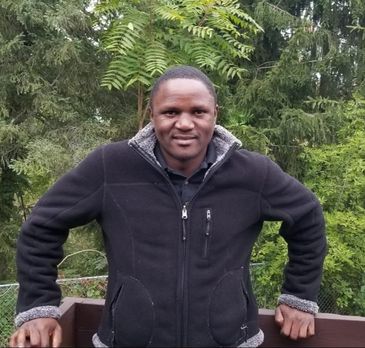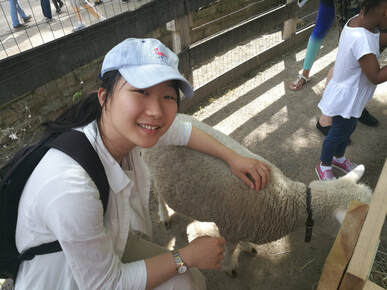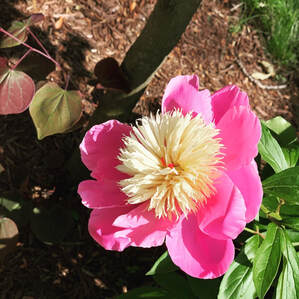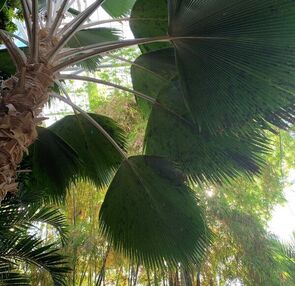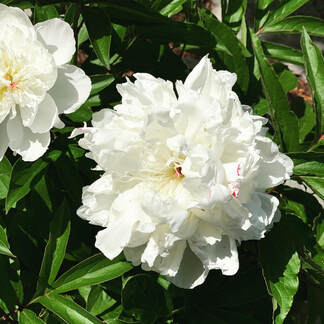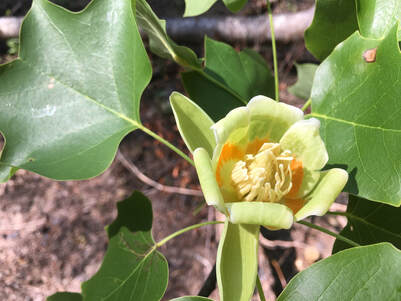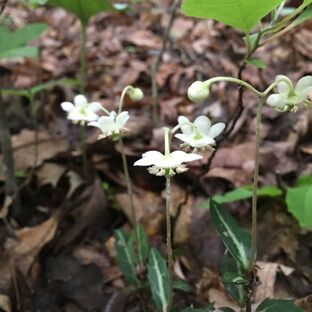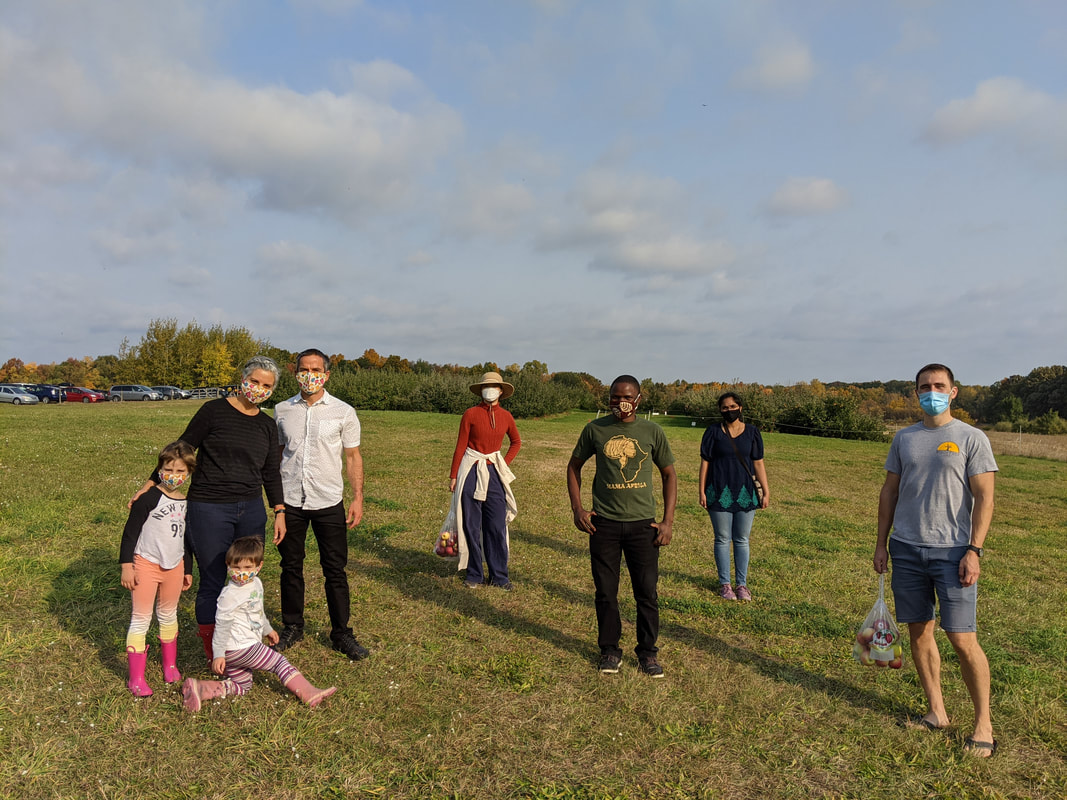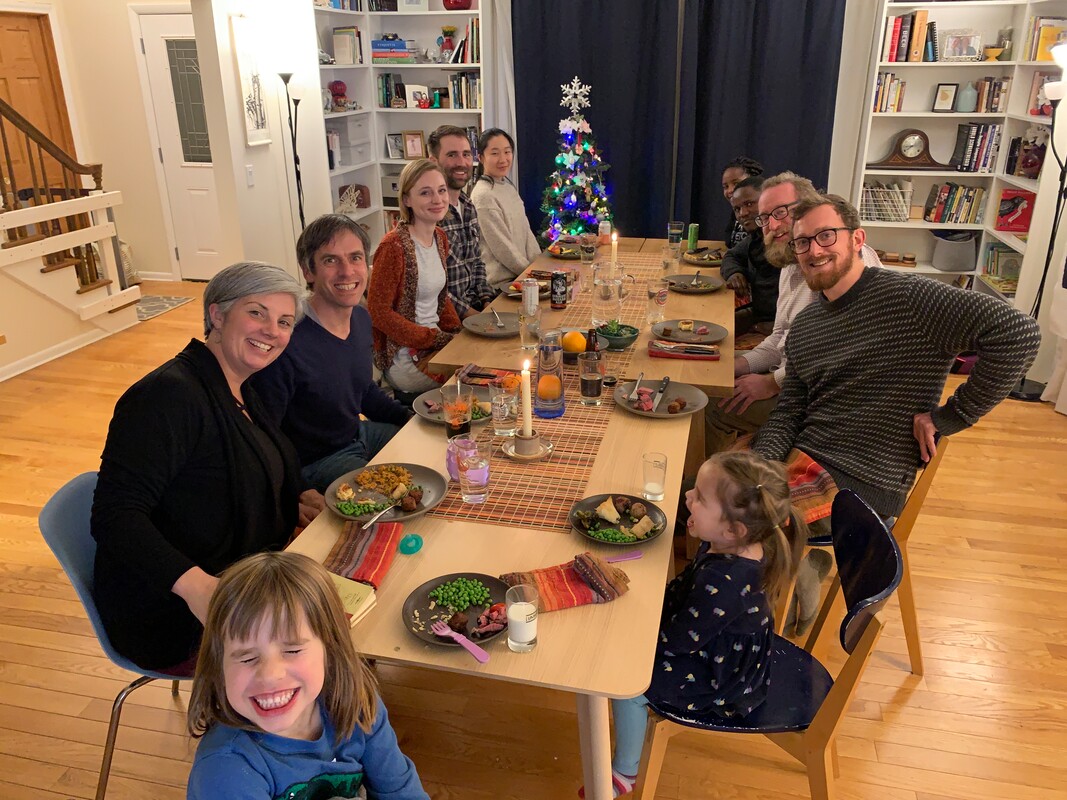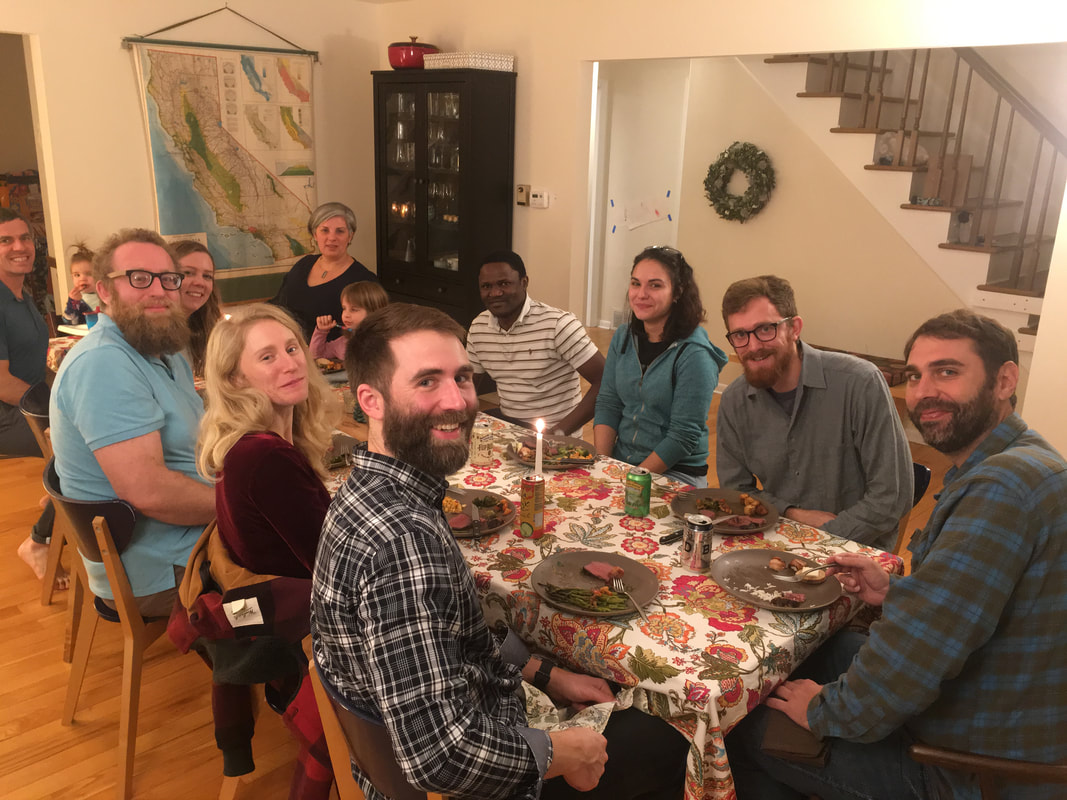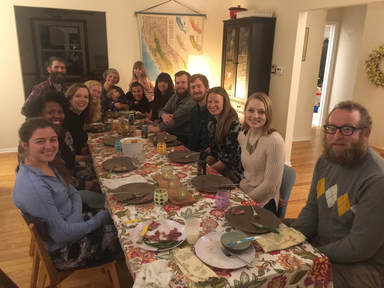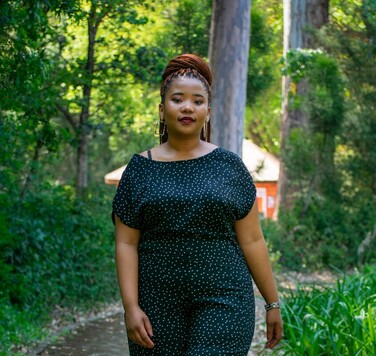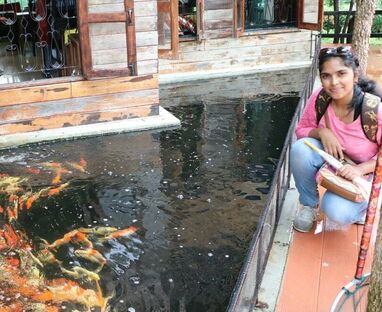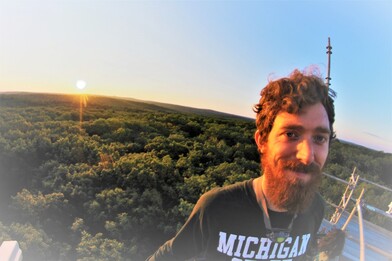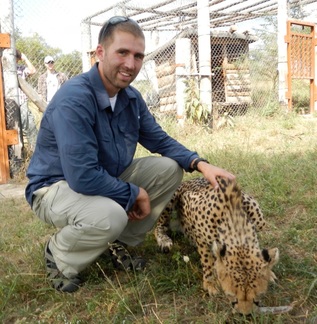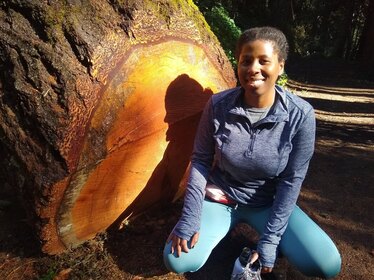Current lab members listed in order of arrival to the lab.
Kyla Marie Dahlin, PhD[On sabbatical at NASA's Jet Propulsion Lab in California for the 22-23 academic year.]
I'm an ecogeographer with interests in remote sensing, GIS, and Earth system modeling and an associate professor in the Department of Geography, Environment, and Spatial Sciences at MSU. I am also an affiliated faculty member in the interdisciplinary program in ecology, evolution, and behavior (EEB), the environmental science and policy program (ESPP), and AgBioResearch. In addition to my time in academia, I've worked as an urban forester in New York City, a restoration ecologist and GIS tech in San Francisco, and on a number of field projects around the US and abroad. When I'm not being a scientist I still spend a lot of time thinking about plants, as well as riding bicycles, crafting, and hanging out with my family. GoogleScholar C.V. |
Donald Akanga, PhD CandidateDonald received B.S in Environmental Studies & Community Development from Kenyatta University -Kenya and M.S in Geospatial Science from University of North Alabama in 2013 and 2018 respectively. He held Project Management Associate and Ag. Nursery Manager positions at Komaza until May 2016 and interned at Lawrenceburg Utility System’s GIS department in Summer 2018. Donald’s research interests include remote sensing, Earth system modeling and GIS applications to nature-society interactions. He has previously used remote sensing to analyze spatiotemporal occurrence of drought in Kenya. Donald’s current research examines past and future carbon cycle in Michigan’s Kalamazoo River Watershed. He’ll always find something to laugh about – isn’t laughter the best medicine?
GoogleScholar C.V. |
Meicheng Shen, PhD CandidateMeicheng is a PhD student in the department of Geography. She received her bachelor’s degree in Geographic Information Science from South China Normal University (Guangzhou, China) and her master’s degree in the Environmental Science Graduate Program from the Ohio State University (Columbus, Ohio). She attempts to understand the causes and effects of vegetation changes in the context of climate change by integrating multi-scale observations and statistical/ecological modeling. She is very excited about joining Dr. Kyla Dahlin’s ERSAM lab and the following PhD life.
C.V. |
Casey Youngflesh, PhD |
Tony Bowman, MS studentMy academic career began with my BSc. in Biology from UT in 2020, followed by attaining a Professional GIS Certificate from the onGEO program in order to expand my experience with using GIS and remotely sensed data. During my projects with NASA DEVELOP, I gained experience using GIS to model habitat suitability for invasive species as well as a native species to support habitat restoration initiatives. My research interests include using hyperspectral imagery and LiDAR data to examine invasive species’ impacts on forest biodiversity and ecosystem biogeochemical processes at multiple spatial scales. My hobbies include hiking, traveling, or truly anything that allows me to explore nature with my partner and our dogs.
C.V. |
ERSAM Lab Socially Distanced 2020Well, 2020 did not pan out as planned. After many many zoom meetings, some of us did manage to get together in person for some socially distanced apple picking before winter arrived.
Including (L to R): Kyla and family, Meicheng, Donald, Manaswini, and Ryan. We also celebrated our two pandemic PhD defenses (Aaron & Ryan)! We were excited to celebrate with past and current lab members now located all over the US.
L to R, top to bottom: Gabriela, Kyla & Hazel, Aaron, Logan, Donald, Ryan, Meicheng, Gloria, Ty and Marielle. |
ERSAM Lab Holiday Party 20182018 was another exciting year with lots of new people and great accomplishments. This year, since the basement climbing wall is up, folks got to test their climbing skills against the kiddos.
Including (L to R): Nathan, Marigold, David, Lynn, Morgan, Kyla, Hazel, Ryan, Donald, Gabriela, Aaron, and Paul. |
ERSAM Lab Holiday Party 20172017 has been a roller coaster of a year, but with many great accomplishments by our group. We had a great time celebrating, playing with toddler toys, and eating lots and lots.
Including (L to R): Logan, Gloria, Ryan, Lynn, Morgan, Kyla, baby Marigold, Nathan, Hazel, Cadi, Brad, Aaron, Marielle, Heather, and David. |
Lab Alumni
Yonela Maziko, PhD Candidate at University of KwaZulu Natal in South Africa and Fulbright Scholar visiting ERSAM LabYonela Maziko is a vibrant young researcher from the Eastern Cape of South Africa. Growing up in rural areas with high poverty rates, she concluded from a young age that a viable solution to many social problems is education. It is with that reason that she pursued higher education, obtaining a Bachelor of science degree in Animal and Pasture science and a Master’s in science from the University of Fort Hare. She is currently registered as a PhD candidate in ecological science at the University of KwaZulu Natal, forming part of the global Drought Network, with specific research interests in climate change impacts on mesic grasslands. As part of her PhD, she is currently Based at Michigan State University as a visiting researcher.
In further exploring her interests in agricultural rural development she was selected to attend the international training programme on community driven rural development, awarded by the National Institute of Rural Development and Panchayati Raj, in India in 2018. She was previously selected as a participant on the Young African Leader’s Initiative (YALI) Leadership Centre in Southern Africa program in 2017 at the University of South Africa (UNISA). She went on to work as a National Research Fund, project management intern at the Technology Innovation Agency in 2019. She currently works as a student assistant at the writing centre for the Durban University of Technology. Her hobbies include hiking, music, reading and being surrounded by nature. Her passion lies in uplifting and bringing change to the impoverished, with the hope that education will assist her to do greater initiatives in the future. C.V. |
Manaswini Ganjam, MS StudentManaswini completed an M. Tech in Environmental Geomatics from Jawaharlal Nehru Technological University (Hyderabad, India), for her master's dissertation work she mapped forest burnt area and degradation of forests in Andhra Pradesh, India. Later she worked at the National Geophysical Research Institute, India, on generating tsunami inundation maps using Geospatial technologies. Also, she has experience working as a Project scientist using high-resolution data for mapping coffee growing regions in India. In 2021 Manaswini decided to pursue a PhD at NCSU instead of finishing her second masters at MSU.
C.V. |
Aaron Kamoske, PhDAaron received a B.S. in Natural Resource Conservation and a certificate in GIS Science and Technologies from the University of Montana’s College of Forestry in 2015. During and following his undergraduate work, he worked on vegetation monitoring projects in the Northern Rockies and as a cartographer for an international NGO. Aaron’s PhD research examined the influences of environmental and anthropogenic variables on closed-canopy forests through the use of imaging spectroscopy and LiDAR remote sensing, spatial statistics, ecological modeling, and field sampling. In 2020 Aaron started a job with the USDA Forest Service at the Geospatial Technology and Applications Center in Salt Lake City. When he is not writing code or sampling forest canopies, he is usually on his bicycle, in the woods, or playing guitar a bit too loud.
Website GoogleScholar C.V. |
Ryan Nagelkirk, PhDRyan received B.S. degrees in Kinesiology and Environmental Geosciences from Michigan State University in 2007 and 2012, respectively. Following his first degree, he served in the U.S. Coast Guard (USCG) in Depoe Bay, Oregon. In 2010, Ryan came back to school to study climate change and its effects on the planet, especially wildlife. Ryan’s research focuses on detecting and predicting impacts of climate change and land use / land cover change on wildlife habitats in Serengeti National park through the use of remote sensing and modeling. Ryan defended his dissertation and graduated in December of 2020, and started a job with the National Resources Conservation Service (NRCS) in Texas. In his spare time, Ryan enjoys cycling (both riding and building bikes), photography, and reading.
GoogleScholar C.V. |
Gloria Desanker, MSGloria received her B.S. degree in Environmental Science from the University of Virginia in 2015 and received her M.S. in Forestry in 2019. Her thesis research looked at mapping phenoregions in Eastern Africa using remotely sensed data and analyses in R. She also participated as a 2018 Environmental Fellows Program fellow and worked with the Nature Conservancy where she mapped areas that were vulnerable to tree canopy loss in disadvantaged communities of NYC, as well as gained experience and knowledge on how to apply spatial analysis to address the needs of historically underprivileged groups. Gloria went on to work with SFEI in Richmond, CA as an environmental analyst where she helped provide guidance, consultation and performed geospatial analyses on projects such as mapping salmon habitat, beach dynamics, and ecosystem services in urban spaces; quantifying carbon stocks; identifying priority areas for climate resilience; and evaluating relationships between green spaces and health. She now works as an environmental geospatial consultant in the Bay Area, CA. Gloria also teaches yoga, and enjoys photography and biking.
|
Sarah Igwe - 2018 (MSU Physiology undergrad)
Opal Jain - 2018 (MSU GEO undergrad)
Logan Brissette - 2017 (MSU FW undergrad) - working as a biological technician at UC Davis
Dom Del Ponte - 2015 (MSU GEO MS-GISci)
Emily Setlock - 2015 (MSU GEO undergrad)
Zach Adham - 2011 (Univ. of Rochester undergrad) - MD student
Alex Kindel - 2011 (Stanford undergrad) - PhD student at Princeton
Julie Ralph - 2009 (Stanford undergrad) - working for Google
Sara Maatta - 2008 (Stanford undergrad)
Chris Fedor - 2008 (Stanford undergrad)
Opal Jain - 2018 (MSU GEO undergrad)
Logan Brissette - 2017 (MSU FW undergrad) - working as a biological technician at UC Davis
Dom Del Ponte - 2015 (MSU GEO MS-GISci)
Emily Setlock - 2015 (MSU GEO undergrad)
Zach Adham - 2011 (Univ. of Rochester undergrad) - MD student
Alex Kindel - 2011 (Stanford undergrad) - PhD student at Princeton
Julie Ralph - 2009 (Stanford undergrad) - working for Google
Sara Maatta - 2008 (Stanford undergrad)
Chris Fedor - 2008 (Stanford undergrad)

